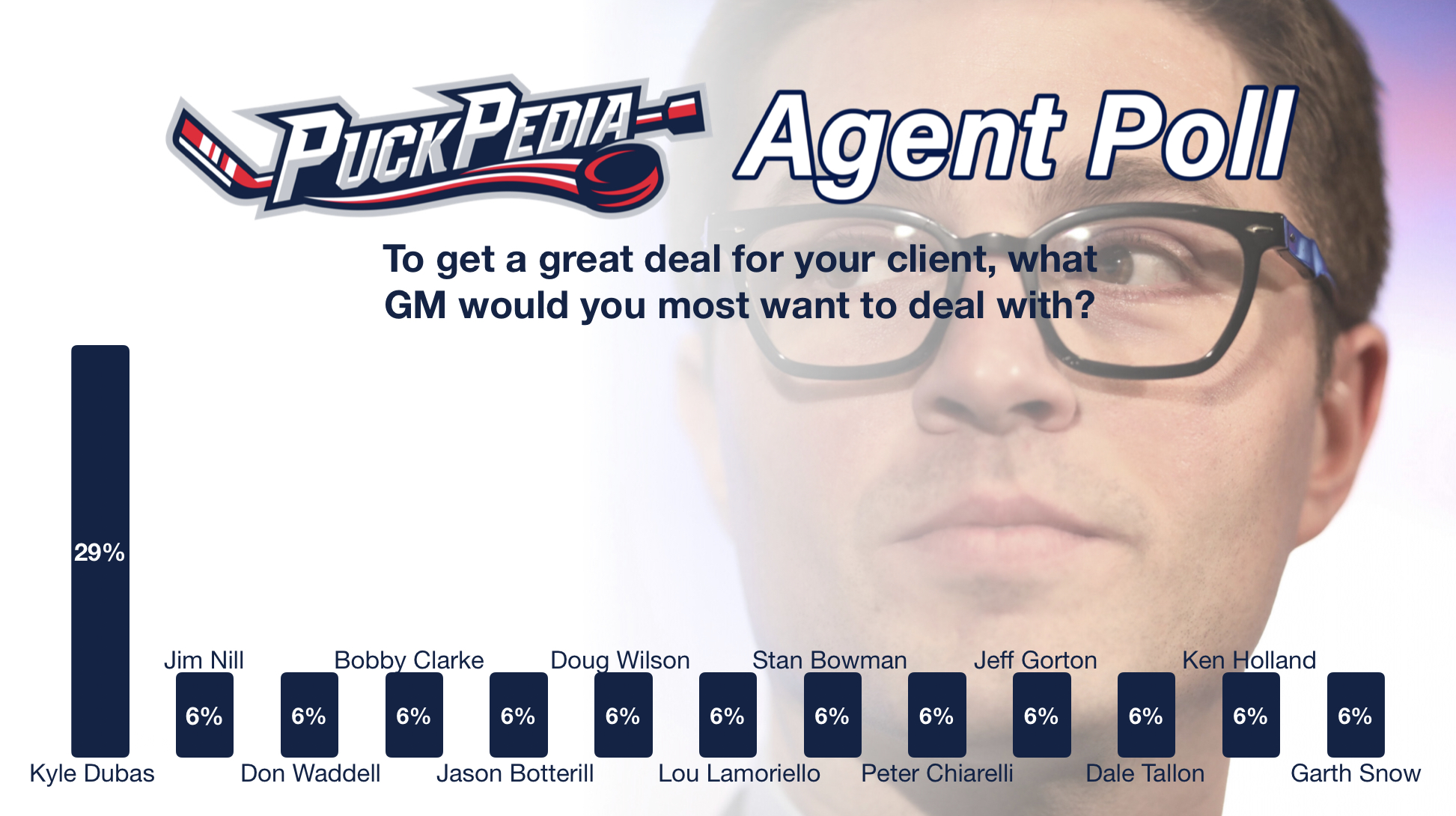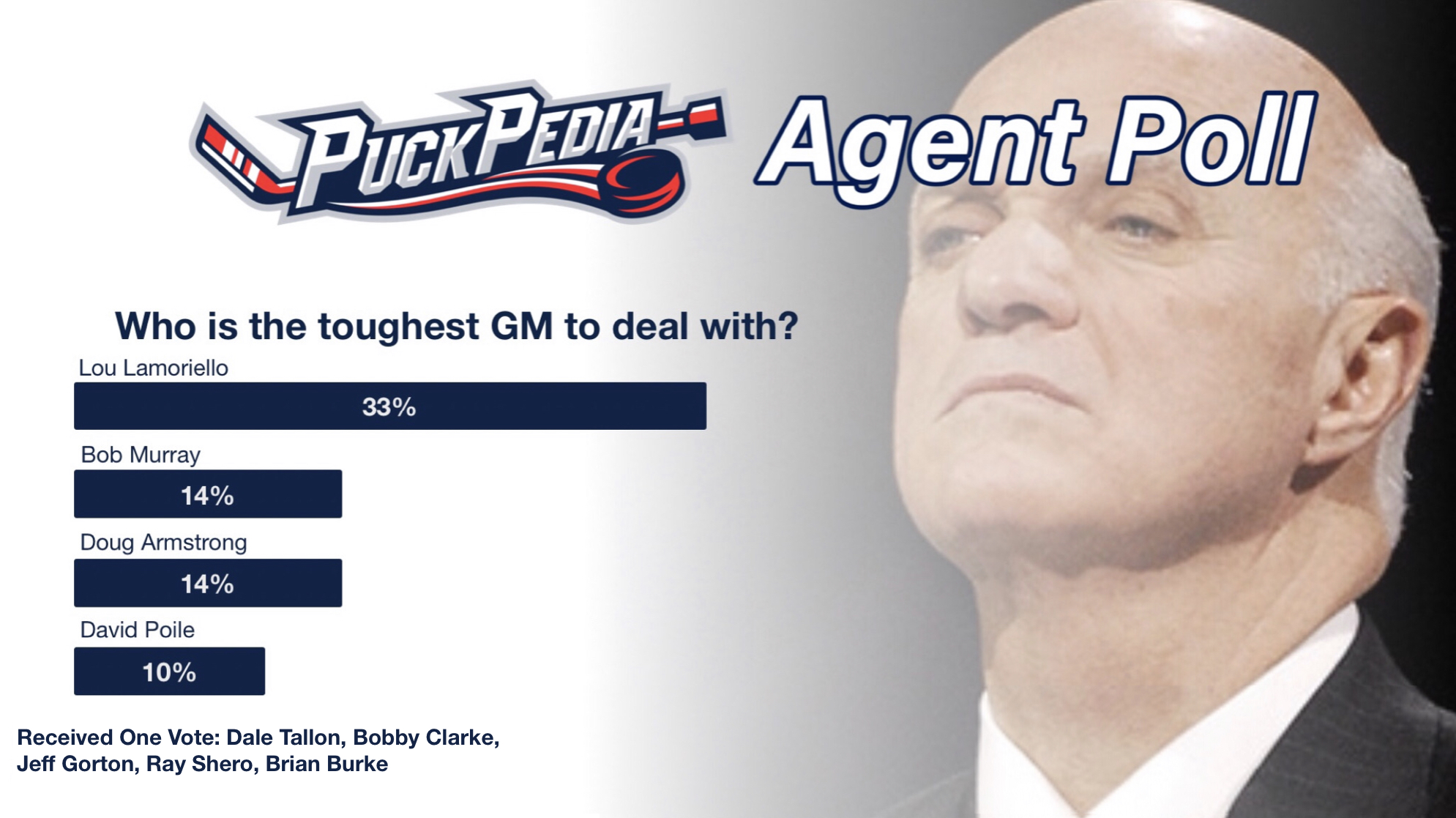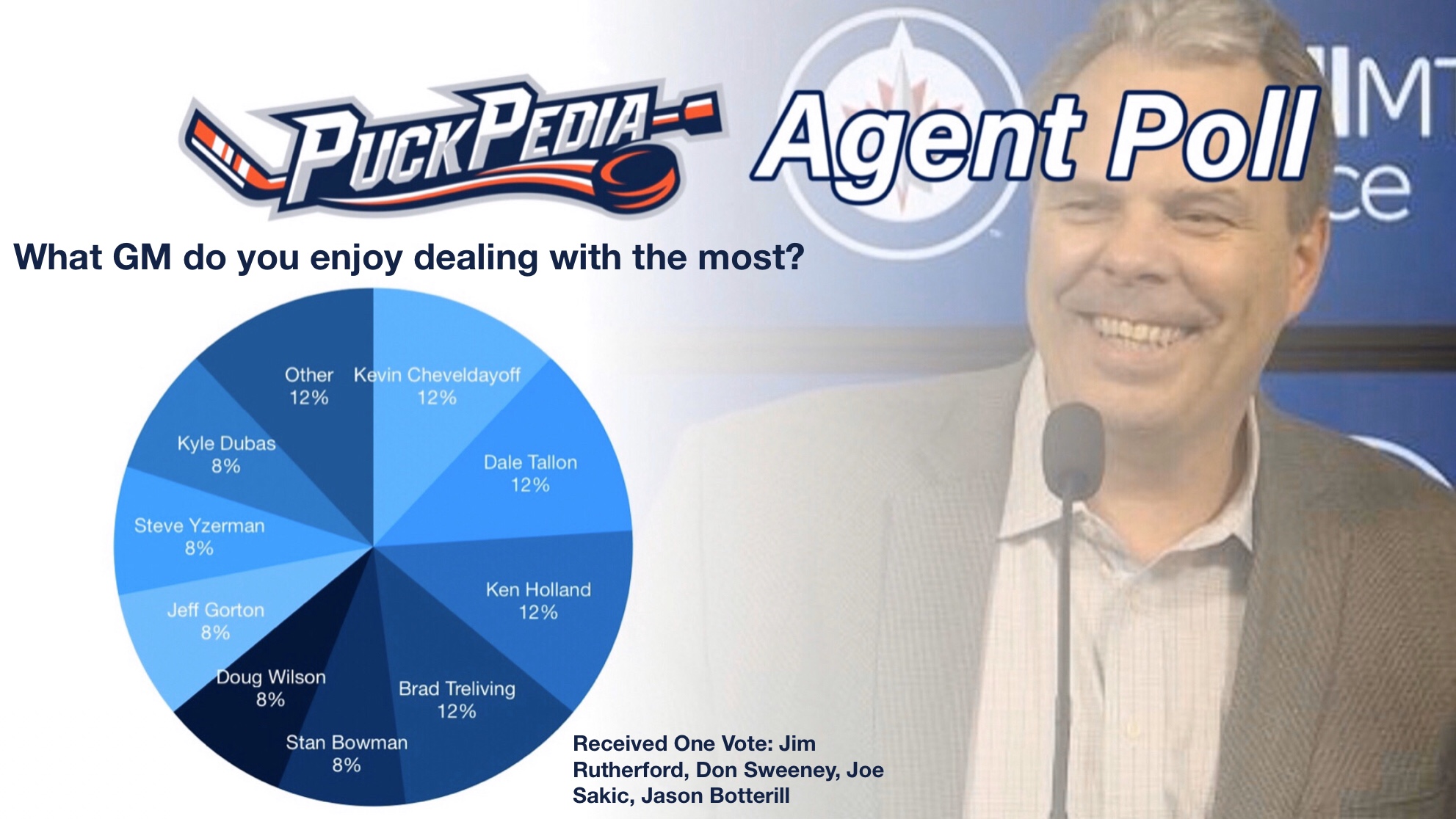ottomaddox
Registered User
I think one should ask the question:
Are player agents honorable people who's opinion you respect?
Are player agents honorable people who's opinion you respect?
He has 1-2 maybe maybe 3 years left as a centre. Then he will shift to left wing. He will always produce points. The issue is his speed. Once he can't stay reasonably close to his opposing centre that will be it.So earlier in the thread there was a lot of talk about Tavares, the potential for decline etc.
I remembered a couple of articles from a few years ago that allow us to actually make a rough model for how that would look rather than relying on anecdotal examples.
How scoring rates change as players age
Old guys on the power play
There's two main take aways from these, that his power play scoring should remain constantish for the remainder of the contract, and that 5v5 "On average, players retain about 90% of their scoring through age 29, but the drop from there is pretty sharp -- they hit 80% at age 31, 70% at age 32-33, and 60% at age 35"
This past year Tavares was 29, so we can use that as a new baseline rather than his peak. 80/90 = 89% of Baseline at 31, 70/90 = 79% of Base at 32-33. There were no numbers given for 3o and 34 so I'll assume a midpoint for each, 85/90 = 94% of baseline at 30, 65/90 = 72% of baseline at 34.
Now, communicating in per 60 rates can get a little convoluted, so let's assume because it's unlikely that he'll be supplanted at C that his minutes will remain relatively constant, and just look at his raw 29 yo output.
39 even strength and 21 pp points in 63 games 2019‑2020 NHL Scoring Leaders or a baseline per 82 games of 51 even strength, 27 PP, 78 total points.
How that looks moving forward
20-21 (30) -> 51 * .94 + 27 = 75
21-22 (31) -> 51 *.89 +27 = 72
22-23 (32) ->51 *.89 + 27 = 72
23-24 (33) ->51 *.79 +27 = 67
24-25 (34) -> 51* .72 +27 = 64
Of course life isn't as clean as exact as this, but that's the curve we would expect the average player to follow based on where Tavares was at 29, so it's a good idea of what we could generally expect.
Then food for thought- Tavares is primarily a mind/ hands player, not a body player. He's never excelled based on physical tools, so a slight age related athletic degradation is going to rob him of an advantage he relied on. The counter point to that is that with too much degradation he won't physically belong in the league. There's anecdotal examples that go both ways
Food for thought 2.0- the average player in the model peaks at 24, and then by 29 (the base year used in this post) has declined to 90% of peak production. Tavares has not yet had such a decline, which arguably lends credence to him declining slower than the average player.
unsuccessful i can seeBeen trying to get him fired for years
He has 1-2 maybe maybe 3 years left as a centre. Then he will shift to left wing. He will always produce points. The issue is his speed. Once he can't stay reasonably close to his opposing centre that will be it.
So earlier in the thread there was a lot of talk about Tavares, the potential for decline etc.
I remembered a couple of articles from a few years ago that allow us to actually make a rough model for how that would look rather than relying on anecdotal examples.
How scoring rates change as players age
Old guys on the power play
There's two main take aways from these, that his power play scoring should remain constantish for the remainder of the contract, and that 5v5 "On average, players retain about 90% of their scoring through age 29, but the drop from there is pretty sharp -- they hit 80% at age 31, 70% at age 32-33, and 60% at age 35"
This past year Tavares was 29, so we can use that as a new baseline rather than his peak. 80/90 = 89% of Baseline at 31, 70/90 = 79% of Base at 32-33. There were no numbers given for 3o and 34 so I'll assume a midpoint for each, 85/90 = 94% of baseline at 30, 65/90 = 72% of baseline at 34.
Now, communicating in per 60 rates can get a little convoluted, so let's assume because it's unlikely that he'll be supplanted at C that his minutes will remain relatively constant, and just look at his raw 29 yo output.
39 even strength and 21 pp points in 63 games 2019‑2020 NHL Scoring Leaders or a baseline per 82 games of 51 even strength, 27 PP, 78 total points.
How that looks moving forward
20-21 (30) -> 51 * .94 + 27 = 75
21-22 (31) -> 51 *.89 +27 = 72
22-23 (32) ->51 *.89 + 27 = 72
23-24 (33) ->51 *.79 +27 = 67
24-25 (34) -> 51* .72 +27 = 64
Of course life isn't as clean as exact as this, but that's the curve we would expect the average player to follow based on where Tavares was at 29, so it's a good idea of what we could generally expect.
Then food for thought- Tavares is primarily a mind/ hands player, not a body player. He's never excelled based on physical tools, so a slight age related athletic degradation is going to rob him of an advantage he relied on. The counter point to that is that with too much degradation he won't physically belong in the league. There's anecdotal examples that go both ways
Food for thought 2.0- the average player in the model peaks at 24, and then by 29 (the base year used in this post) has declined to 90% of peak production. Tavares has not yet had such a decline, which arguably lends credence to him declining slower than the average player.
This is false. You can fail by making bad moves at the time, which countless GMs do.You can't fail this way because you did it the "right way".
Depends who you know. I grew up with one, stand up guy. I’m sure there are shady ones like any sales industryI think one should ask the question:
Are player agents honorable people who's opinion you respect?
It’s inevitable he’ll move to the wing. He’ll always be a beast on the cycle and put up points. I for one am not worried about his contract.He has 1-2 maybe maybe 3 years left as a centre. Then he will shift to left wing. He will always produce points. The issue is his speed. Once he can't stay reasonably close to his opposing centre that will be it.
Guys like Spezza and Thornton have never been burners but have managed to have long successful careers because of their hands, passing ability and IQ. JT has never been known for his skating ability, so I don't see him having a huge decline any time soon unless he ends up having some kind of nagging injury. He has always been a player that makes his linemates better.Good post.
Guys like Tavares isnt relying on bursts of speed to scire amd ao that drop in physical ability will hamper him less. Not to mention star guys with high hockey iqs can continue to reinvent their games as their skating slows.
Plus he plays and thrives alongside younger high skilled giys.
This belief that he is guaranteed to see a huge drop in production is nothing more than (pessimistic) wishful thinking
Yup. Pretty much.Agent poll: Lucic's contract the worst, MacKinnon's most team-friendly
PuckPedia AGENT POLL | Puckpedia



Clarkson got a vote for the worst deal. That’s an X against Nonis.

As a Raptor fan it reminds me of the old "In BC we trust" stans for whom he could never do anything wrong. Now looking back they look pretty silly worshiping the water he supposedly walked on.Dubas DID get completely f***ed on the Matthews and Marner deals. These were RFAs, they had very little leverage. Star RFAs either get good term (5-6 years) but poor $$, or they get poor term (7-8 years) but good $$. Matthews and Marner both got good term and GREAT $$ (2nd highest paid C and W in the league), that’s basically unheard of for RFAs. Dubas did a terrible job on these deals, and deserves to be considered the biggest pushover of all GMs on contract negotiations, which is clearly the case from this survey.
I actually think Dubas is a decent GM overall, but he’s clearly a terrible negotiator, and I don’t see how anyone can disagree with this. Marner has the 2nd highest cap hit of any winger, despite being an RFA, nowhere remotely close to the 2nd best winger in the league, AND he got player friendly term. Matthews and Tavares are 2nd and 3rd in the league for centre cap hit - at least JT was a UFA, but Matthews was an RFA and got extremely player friendly term. No other GM is close to Dubas in terms of weak negotiation.
This is a pretty harsh and unfair comment.yes we were and you blamed the goalies for Johnny's failures , well Johnny has been a failure for 11 years , 9 with NY and 2 with us so that makes 11 years the goalies let him down
This.....is very well put. You have not been a real fan of Dubas, but you are 100% right with this.People need to get over the signings. Whether your a believer that they are fair(vocal minority), overpayments and undertermed(vast majority) or think they are gross unprecedented overpayments (waffles) it's time to move on. I dont see matthews/marner/nylander plateauing. They will improve there compete and two way play. The first two will give 95-110 points over the next 4-5 seasons if healthy and nylander will give 70-85 if healthy. We have a string core almost fully built. Just need one RHD that fits in long term plans.
If Robertson is as good as the vibes I'm getting ( max potential in seeing is him challenging matthews as the teams best goal scorer which is insane) Dubas needs threads talking about his strong drafting (sandin looks like an stud as well). Dubas and his team so far have looked like high end drafting team. If you combine UFA developmental options than mik, barbanov, and Lehtonen all could further boost dubas in this area.
He is also pretty good at trades with the exception of the kadri debacle. The muzzin trade looks better know with us seeing durzi not taking a big step and grundstrom still not an NHLer. Plus muzzin is a quality 2/3 signed for 4 more years and should continue that performance for atleast another 2 seasons.
Dubas is an A drafter and developer, a B+ trader, and a C- negotiator. He is still new to the job with only 2 years as GM. I'm hoping he can improve in negotiations over the next while with rielly, andersen/new goalie deals required.
So earlier in the thread there was a lot of talk about Tavares, the potential for decline etc.
I remembered a couple of articles from a few years ago that allow us to actually make a rough model for how that would look rather than relying on anecdotal examples.
How scoring rates change as players age
Old guys on the power play
There's two main take aways from these, that his power play scoring should remain constantish for the remainder of the contract, and that 5v5 "On average, players retain about 90% of their scoring through age 29, but the drop from there is pretty sharp -- they hit 80% at age 31, 70% at age 32-33, and 60% at age 35"
This past year Tavares was 29, so we can use that as a new baseline rather than his peak. 80/90 = 89% of Baseline at 31, 70/90 = 79% of Base at 32-33. There were no numbers given for 3o and 34 so I'll assume a midpoint for each, 85/90 = 94% of baseline at 30, 65/90 = 72% of baseline at 34.
Now, communicating in per 60 rates can get a little convoluted, so let's assume because it's unlikely that he'll be supplanted at C that his minutes will remain relatively constant, and just look at his raw 29 yo output.
39 even strength and 21 pp points in 63 games 2019‑2020 NHL Scoring Leaders or a baseline per 82 games of 51 even strength, 27 PP, 78 total points.
How that looks moving forward
20-21 (30) -> 51 * .94 + 27 = 75
21-22 (31) -> 51 *.89 +27 = 72
22-23 (32) ->51 *.89 + 27 = 72
23-24 (33) ->51 *.79 +27 = 67
24-25 (34) -> 51* .72 +27 = 64
Of course life isn't as clean as exact as this, but that's the curve we would expect the average player to follow based on where Tavares was at 29, so it's a good idea of what we could generally expect.
Then food for thought- Tavares is primarily a mind/ hands player, not a body player. He's never excelled based on physical tools, so a slight age related athletic degradation is not going to rob him of an advantage he relied on. The counter point to that is that with too much degradation he won't physically belong in the league. There's anecdotal examples that go both ways
Food for thought 2.0- the average player in the model peaks at 24, and then by 29 (the base year used in this post) has declined to 90% of peak production. Tavares has not yet had such a decline, which arguably lends credence to him declining slower than the average player.
People need to get over the signings. Whether your a believer that they are fair(vocal minority), overpayments and undertermed(vast majority) or think they are gross unprecedented overpayments (waffles) it's time to move on. I dont see matthews/marner/nylander plateauing. They will improve there compete and two way play. The first two will give 95-110 points over the next 4-5 seasons if healthy and nylander will give 70-85 if healthy. We have a string core almost fully built. Just need one RHD that fits in long term plans.
If Robertson is as good as the vibes I'm getting ( max potential in seeing is him challenging matthews as the teams best goal scorer which is insane) Dubas needs threads talking about his strong drafting (sandin looks like an stud as well). Dubas and his team so far have looked like high end drafting team. If you combine UFA developmental options than mik, barbanov, and Lehtonen all could further boost dubas in this area.
He is also pretty good at trades with the exception of the kadri debacle. The muzzin trade looks better know with us seeing durzi not taking a big step and grundstrom still not an NHLer. Plus muzzin is a quality 2/3 signed for 4 more years and should continue that performance for atleast another 2 seasons.
Dubas is an A drafter and developer, a B+ trader, and a C- negotiator. He is still new to the job with only 2 years as GM. I'm hoping he can improve in negotiations over the next while with rielly, andersen/new goalie deals required.
Drafting completely remains to be seen. Forget about grading him against 30 other GM's, how can you grade someone an "A" without a single one of his draft picks materializing into an NHL player? The jury is still out.
What we've definitely learned is that the "trading down" strategy hasn't materialized a single thing so far.
Why have your 2nd round pick score at a historic pace in the OHL and challenge for the taxi squad as a 19 year old when you can have your 2nd round pick be a double overage KHLer with bad numbers who takes 3-4 years to get a 4th line tryout.
At least our mid-round picks actually make sense now and generally would go higher in a D+1 redraft.
So again, nothing has materialized.
And with that, Dubas' patented and much-hyped "overager" and "trading down" theories have amounted to a total of nothing.
When it comes to growing into a job, I think of John Wooden who was hired as head coach of the UCLA Bruins in 1948 and won the first of his ten NCAA basketball championships in 1964, in his 16th season as head coach of UCLA. In his first 18 years of coaching he won no national championships, and in his last 12 years he won ten, including a record seven consecutive NCAA championships.This.....is very well put. You have not been a real fan of Dubas, but you are 100% right with this.
David Poile was not the David Poile of today in his first 18 months. Sam Pollock wasn't either.
No one comes in perfect. That is the issue, and that is the message. People still pining for Lou to negotiate the big 3 contracts is hilarious, given his recent track record of negotiating. Maybe the reason he bailed is because he knew his rep would be killed, and then he did even worse with the Islanders......which not many people couldn't see.
